2018版七年级英语下册Module4LifeinthefutureUnit1Everyonewillstudyathome课后练习(新版)外研版
- 格式:doc
- 大小:69.50 KB
- 文档页数:2
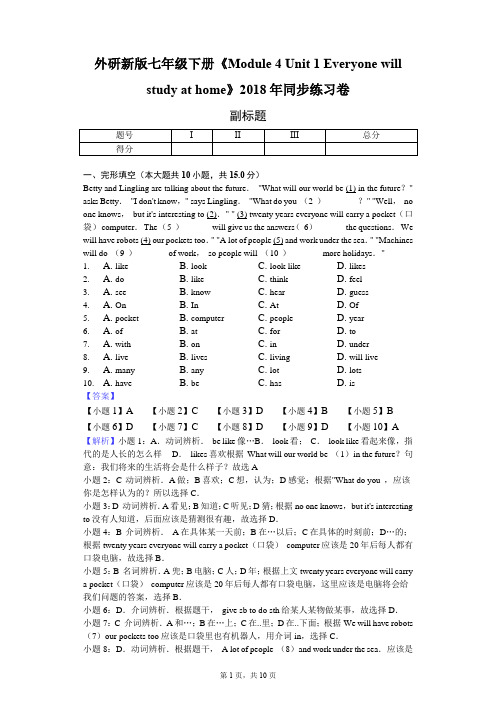
外研新版七年级下册《Module 4 Unit 1 Everyone will study at home》2018年同步练习卷副标题一、完形填空(本大题共10小题,共15.0分)Betty and Lingling are talking about the future."What will our world be (1) in the future?" asks Betty."I don't know," says Lingling."What do you (2 )______ ?" "Well,no one knows,but it's interesting to (2)." " (3) twenty years everyone will carry a pocket(口袋)computer.The (5 )______ will give us the answers(6)______ the questions.We will have robots (4) our pockets too." "A lot of people (5) and work under the sea." "Machines will do (9 )______ of work,so people will (10 )______ more holidays."1. A. like B. look C. look like D. likes2. A. do B. like C. think D. feel3. A. see B. know C. hear D. guess4. A. On B. In C. At D. Of5. A. pocket B. computer C. people D. year6. A. of B. at C. for D. to7. A. with B. on C. in D. under8. A. live B. lives C. living D. will live9. A. many B. any C. lot D. lots10. A. have B. be C. has D. is【答案】【小题1】A 【小题2】C 【小题3】D 【小题4】B 【小题5】B 【小题6】D 【小题7】C 【小题8】D 【小题9】D 【小题10】A 【解析】小题1:A.动词辨析.be like像…B.look看;C.look like看起来像,指代的是人长的怎么样D.likes喜欢根据What will our world be (1)in the future?句意:我们将来的生活将会是什么样子?故选A小题2:C 动词辨析.A做;B喜欢;C想,认为;D感觉;根据"What do you ,应该你是怎样认为的?所以选择C.小题3:D 动词辨析.A看见;B知道;C听见;D猜;根据no one knows,but it's interesting to没有人知道,后面应该是猜测很有趣,故选择D.小题4:B 介词辨析.A在具体某一天前;B在…以后;C在具体的时刻前;D…的;根据twenty years everyone will carry a pocket(口袋)computer应该是20年后每人都有口袋电脑,故选择B.小题5:B 名词辨析.A兜;B电脑;C人;D年;根据上文twenty years everyone will carry a pocket(口袋)computer应该是20年后每人都有口袋电脑,这里应该是电脑将会给我们问题的答案,选择B.小题6:D.介词辨析.根据题干,give sb to do sth给某人某物做某事,故选择D.小题7:C 介词辨析.A和…;B在…上;C在..里;D在..下面;根据We will have robots (7)our pockets too应该是口袋里也有机器人,用介词in,选择C.小题8:D.动词辨析.根据题干,A lot of people (8)and work under the sea.应该是很多人将在海底居住和工作,是畅想,所以时态是一般将来,构成是will do sth,所以选择D.小题9:D.形容词辨析.A很多,后面加可数名词复数形式;B任何的,一般用于否定句或问句,C非常,副词,;D一般是lots of固定短语,结合题干Machines will do (9 )of work,选择D.小题10:A.动词辨析.根据so people will (10 )more holidays,will后面用动词原型,排除C、D,结合句意应该是有更多假期,故选择A.文章大意:这篇文章讲述了贝蒂和玲玲在想象我们未来生活的样子.对于此类记叙文章,答题时需要把握好答题的方法,首先对文章进行整体的阅读,初中的完型来说不难,重在对单词词义的考察及其整个文章语言逻辑关系的判断.所以在平时的学习中除了多去积累记忆单词外,还需要适当做题,保持良好的语感与阅读的习惯.二、补充句子(本大题共38小题,共76.0分)11.After the new teacher comes, everyone______(will study, studies) English hard in our class.【答案】studies【解析】答案:studies.根据这个句子的前半部分After the new teacher comes,这部分用了一般现在时,所以后半部分也要用一般现在时,因此可知这句话的意思是"在新老师来了之后,我们班里每个人都很努力的学习英语."故选studies.在新老师来了之后,我们班里每个人都很努力的学习英语.首先要掌握这个句子的意思,然后结合具体的题目,就可以确定正确答案.12.Our teacher______(will teach, is teaching) us something about animals next week.【答案】will teach【解析】答案:will teach.根据时间状语next week,下周,这是一个表将来的时间状语,所以要用一般将来时来填空,因此可知这句话的意思是"我们的老师下周将要教我们一些关于动物的事情."故选will teach.我们的老师下周将要教我们一些关于动物的事情.首先要掌握这个句子的意思,然后结合具体的题目,就可以确定正确答案.13.Look! There______(is, is going to be) a bridge over the river soon.【答案】is going to be【解析】答案:is going to be根据句中的时间状语为soon,故确定为一般将来时态,结合该句为there be 结构,其将来时态为there is/are going to be或者there will be,对照所给的答案可知主语a bridge 为单数故确定be动词为is 故答案为:is going to be.看!河上很快就要有一座桥了.本题考查用所给单词的适当形式填空,首先要根据语境明确句意,然后再根据相关语法对所给单词做出正确选择.14.Jack and I______(is leaving, will leave) for Beijing tomorrow.【答案】will leave【解析】答案:will leave根据句中的时间状语为tomorrow,故确定为一般将来时态,其结构为will+动词原形,这里主语是复数,故答案为:will leave.杰克和我明天动身去北京.本题考查用所给单词的适当形式填空,首先要根据语境明确句意,然后再根据相关语法对所给单词做出正确选择.15.Teachers can______(check, checks) the students' level and help them.【答案】check【解析】答案:check根据空格前为情态动词can 后跟动词原形,故答案为:check.教师可以检查学生的水平并帮助他们.本题考查用所给单词的适当形式填空,首先要根据语境明确句意,然后再根据相关语法对所给单词做出正确选择.16.Teachers______(won't, aren't) use chalk to write on a blackboard in the future.【答案】won't【解析】答案:won't根据句中的时间状语为in the future 故确定为一般将来时态,其结构为will +动词原形,否定句在will 后加not缩写为won't后跟动词原形,故答案为:won't.将来老师不会用粉笔在黑板上写字.本题考查用所给单词的适当形式填空,首先要根据语境明确句意,然后再根据相关语法对所给单词做出正确选择.17.-______(Will, Would) you like a cup of coffee?-Yes, I'd love to.【答案】Would【解析】答案:Would根据句中含有固定句型would you like sth意为"你想要…吗"故答案为:Would.-你想喝杯咖啡吗?-是的,我很愿意.本题考查用所给单词的适当形式填空,首先要根据语境明确句意,然后再根据相关语法对所给单词做出正确选择.18.What______(is, are) your plan for next week?【答案】is【解析】答案:is.根据What--(is, are) your plan for next week,可知句子叙述一件事实,时态用一般现在时,主语是单数.故填is.你下周的计划是什么?本题考查用所给单词的适当形式填空,首先要根据语境明确句意,然后再根据相关语法对所给单词在形式上做出正确的变化.19.There______(is, are) an apple and some eggs on the table.【答案】is【解析】答案:is.根据There--(is, are) an apple and some eggs on the table,句子叙述一件事实,时态用一般现在时,这里使用就近原则,an apple是单数.故填is.桌上有一个苹果和一些鸡蛋.本题考查用所给单词的适当形式填空,首先要根据语境明确句意,然后再根据相关语法对所给单词在形式上做出正确的变化.20.Dick______(like, likes) vegetables so much.【答案】likes【解析】答案:likes.根据Dick--(like, likes) vegetables so much,可知句子叙述一件事实,时态用一般现在时,主语是单数.故填likes.Dick非常喜欢蔬菜.本题考查用所给单词的适当形式填空,首先要根据语境明确句意,然后再根据相关语法对所给单词在形式上做出正确的变化.21.Your English______(水平) is quite high.【答案】level【解析】答案:levellevel 水平,可数名词,由is可知主语是单数,填写其单数形式即可.你的英语水平相当高.解答此题需要根据中文联想出正确的单词,再结合题目,考虑是否有形式上的变化.22.Please don't get up so late any______(不再).【答案】more【解析】答案:morenot…any more 不再……,填more即可.请不要再起床这么晚了.解答此题需要根据中文联想出正确的单词,再结合题目,考虑是否有形式上的变化.23.Why does Mary have so many______(问题) for us?【答案】questions【解析】答案:questions question 问题,可数名词,有many修饰,使用其复数形式.为什么Mary有这么多的问题?解答此题需要根据中文联想出正确的单词,再结合题目,考虑是否有形式上的变化.24.We don't want to______(改变) our plan for the holiday.【答案】change【解析】答案:changechange 改变,动词;want to do sth 想做某事,使用change的不定式to change.我们不想改变假期计划.解答此题需要根据中文联想出正确的单词,再结合题目,考虑是否有形式上的变化.25.______(也许) nobody can help her with it.【答案】Maybe【解析】答案:Maybemaybe 也许,副词作状语.也许没有人能帮上她的忙.解答此题需要根据中文联想出正确的单词,再结合题目,考虑是否有形式上的变化.26.What______ you______(do) tomorrow evening?【答案】will;do【解析】答案:will do.根据tomorrow evening,可知句子用于一般将来时,构成will+动词原形.故填will do.明天晚上你将做什么?1本题考查用所给单词的适当形式填空,首先要根据语境明确句意,然后再根据相关语法对所给单词在形式上做出正确的变化.27.-Will you stay with us?-No, we______(not).【答案】won't【解析】答案:won't.根据Will you stay with us,可知否定回答应该用won't.故填won't.--你们将和我们呆在一起吗?--不,我们不会的.本题考查用所给单词的适当形式填空,首先要根据语境明确句意,然后再根据相关语法对所给单词在形式上做出正确的变化.28.Will the children have a lot of homework______(do)?【答案】to do【解析】答案:to do 根据提示,推测意思是孩子们将有很大作业要做吗?考查句式have sth.to do,故答案是to do.孩子们将有很大作业要做吗?解答这类试题时,务必充分理解上下文的语境和前后文的逻辑关系,找到解题的依据,同时考虑单词的适当形式,准确作答.29.In twenty______(year) time, maybe there won't be any schools.【答案】years'【解析】答案:years' 根据提示,推测意思是再过二十年,也许就不会有学校了.这里需要一个形容词作定语修饰后面的名词,且前面是复数twenty,故用复数名词的所有格,故答案是years'.再过二十年,也许就不会有学校了.解答这类试题时,务必充分理解上下文的语境和前后文的逻辑关系,找到解题的依据,同时考虑单词的适当形式,准确作答.30.Robert, you can ask______(you) teachers questions through Internet.【答案】your【解析】答案:your 根据提示,推测意思是罗伯特,你可以通过因特网向你的老师问问题.用形容词作定语修饰后面的名词,故答案是your.罗伯特,你可以通过因特网向你的老师问问题.解答这类试题时,务必充分理解上下文的语境和前后文的逻辑关系,找到解题的依据,同时考虑单词的适当形式,准确作答.31.Everything______(be) very different here now.【答案】is【解析】答案:is 根据提示,推测意思是现在这里的一切都非常不同了.时态是一般现在时,主语是三单,故答案是is.现在这里的一切都非常不同了.解答这类试题时,务必充分理解上下文的语境和前后文的逻辑关系,找到解题的依据,同时考虑单词的适当形式,准确作答.32.All of the children enjoy______(draw) in class.【答案】drawing【解析】答案:drawing 根据提示,推测意思是课堂上所有的孩子都喜欢画画.考查短语enjoy doing,故答案是drawing.课堂上所有的孩子都喜欢画画.解答这类试题时,务必充分理解上下文的语境和前后文的逻辑关系,找到解题的依据,同时考虑单词的适当形式,准确作答.33.There______(be) plenty of time for us.【答案】is【解析】答案:is根据该句描述的是现在的状况故确定为一般现在时态,根据该句为there be 结构,主语time为不可数名词,只有单数,故答案为:is.我们有足够的时间.本题考查用所给单词的适当形式填空,首先要根据语境明确句意,然后再根据相关语法对所给单词在形式上做出正确的变化.34.We all can dance very______(good).【答案】well【解析】答案:well根据该空处在句中作状语修饰动词dance,故填入副词,所给词good"好的"为形容词其对应的副词为well"好地",故答案为:well.我们跳舞都很好.本题考查用所给单词的适当形式填空,首先要根据语境明确句意,然后再根据相关语法对所给单词在形式上做出正确的变化35.We'd like______(talk) with each other in Chinese.【答案】to talk【解析】答案:to talk根据句中We'd like是we would like的缩写形式,可知句中含有固定短语would like to do sth 意为"想干某事",故填入talk的动词不定式形式,故答案为:to talk.我们想用中文交谈.本题考查用所给单词的适当形式填空,首先要根据语境明确句意,然后再根据相关语法对所给单词在形式上做出正确的变化.36.你不再是一个孩子了.You______ a child______.【答案】aren't;any longer【解析】分析句子,缺少不再的表达,英语是短语not…any longer,时态是一般现在时,主语是你,故答案是aren't,any longer.You aren't a child any longer.解答翻译这类试题时,翻译既要忠实于原文,又要符合汉语和英语的语法规则和表达习惯,准确翻译.37.将来也许没有商店.______,maybe there won't be any shops.【答案】In the future【解析】分析句子,缺少在将来的表达,英语是in the future,句首大写,故答案是In the future.In the future,maybe there won't be any shops.解答翻译这类试题时,翻译既要忠实于原文,又要符合汉语和英语的语法规则和表达习惯,准确翻译.38.赵军能在一个新地方很快地交上朋友.Zhao Jun can______ quickly in a new place.【答案】make friends【解析】分析句子,缺少交朋友的表达,英语是make friends,前面是can,后接动词原形,故答案是make friends.Zhao Jun can make friends quickly in a new place.解答翻译这类试题时,翻译既要忠实于原文,又要符合汉语和英语的语法规则和表达习惯,准确翻译.39.你通常从哪里获取有关足球的信息呢?Where do you often____________ about football?【答案】get;information【解析】答案.get information根据题干,可知需要翻译的是"获取信息",其英语表达形式是"get information",结合时态为一般现在时,do后面接动词原形,information是不可数名词,没有复数形式,故答案为get information.Where do you often get information about football?做这类题型,首先根据所给汉语明确句子所要考查的单词或短语的拼写,再结合相关语法知识对单词或短语做出形式上的变化.40.这台新电脑将能为我做许多事情.This new computer will______ do many things for me.【答案】be able to【解析】首先通过中英文句子的比对,可知英文句子中缺少" 能够"的表达.短语"能够"的英文表达是:be able to,根据设空处前面的助动词will判断填be动词原形,故答案为:be able to.This new computer will be able to do many things for me.做这类题型,首先根据所给汉语明确句子所要考查的单词或短语的拼写,再结合相关语法知识对单词或短语做出形式上的变化.41.十年后他将会是一位伟大的科学家.______,he will be a great scientist.【答案】In ten years' time【解析】首先通过中英文句子的比对,可知英文句子中缺少"十年后"的表达.短语"十年后(用于一般将来时)"的英文表达是:In ten years' time.故答案为:In ten years' time.In ten years' time ,he will be a great scientist.做这类题型,首先根据所给汉语明确句子所要考查的单词或短语的拼写,再结合相关语法知识对单词或短语做出形式上的变化.42.周末我们都会有许多空闲的时间.At weekends we'll have______ free time.【答案】a lot of【解析】首先通过中英文句子的比对,可知英文句子中缺少"许多"的表达.短语"许多"的英文表达是: a lot of.故答案为: a lot of.At weekends we'll have a lot of free time.做这类题型,首先根据所给汉语明确句子所要考查的单词或短语的拼写,再结合相关语法知识对单词或短语做出形式上的变化.43.学生们既没有纸,也没有铅笔.The students______ have paper______ pencils.【答案】don't;or【解析】这是一个否定句,句子表述的是现在的情况,所以用一般现在时,主语是复数名词,借助于助动词don't ,否定句中表示并列用or不用and.故答案为:don't ,or.The students don't have paper or pencils.做这类题型,首先根据所给汉语明确句子所要考查的单词或短语的拼写,再结合相关语法知识对单词或短语做出形式上的变化.44.There are five girls in the room.(对画线部分提问)______ girls are there in the room?【答案】How many【解析】答案:How many.考查划线部分提问.根据five五.可知,对数量提问,且修饰可数名词复数girls女孩们.用疑问词组How many多少.--房间里有五个女孩.--房间里有几个女孩?对划线部分提问,要根据划线部分内容选择合适的疑问词,剩下的变为一般疑问句.注意区分疑问词的用法.会正确运用一般疑问句用法.45.These are our new chairs.(改为同义句)These new chairs______.【答案】are ours【解析】答案:are ours.考查同义句."这些是我们的新椅子",可以表达为"这些新的椅子是我们的",主语chairs复数.一般现在时态,用be动词复数are是.为了避免与前面名词重复.用名词性物主代词ours代替our chairs我们的椅子.答案是are ours.--这些是我们的新椅子.--这些新的椅子是我们的.同义句转换最基本的是要保持原意不变,在理解语境的基础上,抓住关键单词或词组,运用相同词意的单词或词组完成试题.46.Our life will be different in the future.(改为否定句)Our life______ different in the future.【答案】won't be【解析】答案:won't be.考查否定句.含有情态动词will,变否定句在will后加not.缩写为won't.情态动词后用be动词原形be.答案是won't be.--我们的生活将在未来不同.--我们的生活在未来不会有什么不同.考查否定句.通常是在be动词,情态动词后加not.一般现在时态,主语不是第三人称单数用don't,主语是第三人称单数用doesn't.一般过去时态用didn't.还有其它用法需要牢记.47.I'm good at basketball. I can't play tennis.(合并为一句)I'm good at basketball,______ I______ play tennis.【答案】but;can't【解析】答案:but;can't.考查同义句."我擅长打篮球,我不会打网球",可以表达为"我擅长打篮球,但我不会打网球",用but但是,连接两个句子,表示转折.第二个空用can't.答案是but;can't.--我擅长打篮球,我不会打网球.--我擅长打篮球,但我不会打网球.同义句转换最基本的是要保持原意不变,在理解语境的基础上,抓住关键单词或词组,运用相同词意的单词或词组完成试题.48.My brothers will cook for us.(对画线部分提问)______ your brothers______【答案】What will;do?【解析】答案:What will;do.考查划线部分提问.根据cook for us为我们做饭.可知,对动词短语提问用what…do?"…做什么?".疑问词what后跟一般疑问句.情态动词will提前.划线部分用do代替.答案是What will;do.--我的兄弟们会为我们做饭.--你的兄弟会做什么?对划线部分提问,要根据划线部分内容选择合适的疑问词,剩下的变为一般疑问句.注意区分疑问词的用法.会正确运用一般疑问句用法.三、完成对话(本大题共1小题,共5.0分)49.Kate-K;Tian Ye-TK:Good morning,Tian Ye.T:Good morning,Kate.K:Do you have any good ideas about the future?T:Sure.(1)______K:Everything?T:Yes.You know I'm the only child in my family.(2)______ No one can play with me.K:(3)______T:The fruit basket.I like eating fruit and I often go shopping for some fruit.(4)______K:That sounds great! (5)______T:I see! This is only my beautiful dream!A.What thing do you hope to play with?B.But I don't think your idea will come true!C.I hope everything in my house can speak.D.I often stay at home alone.E.After shopping,I hope to play football with the basket.【答案】【小题1】C【小题2】D【小题3】A【小题4】E【小题5】B【解析】1.C.根据上文"Sure"可知,田叶对于未来有很好的想法.根据下文"Everything"可知,凯特反问田叶"一切",故知田叶在此说的是"一切都……",故选C.2.D.根据上文"You know I'm the only child in my family"可知,田叶说,自己是家里唯一的孩子.根据下文"No one can play with me"可知,没有人和她一起玩,故知这里说的是"我很孤独"之类,故选D.3.A.根据上文"No one can play with me"可知,没有人和田叶一起玩.根据下文"The fruitbasket"和"I like eating fruit and I often go shopping for some fruit"可知,田叶回答说"水果篮",并说她喜欢吃水果,经常去买水果,故知这里说的是"你玩什么"之类,故选A.4.E.根据上文"I like eating fruit and I often go shopping for some fruit"可知,田叶喜欢吃水果,经常去买水果.根据下文"That sounds great"可知,凯特表示赞叹,故知在此田叶提出了一个建议,或想法,故选E.5.B.根据下文"I see"和"This is only my beautiful dream"可知,田叶说她知道,并说这是自己仅有的美好梦想,故知在此凯特说的是"你的想法不可能实现"之类,故选B.凯特--凯田叶--田凯:早上好,田叶!田:早上好,凯特!凯:对于未来你有什么好想法吗?田:当然了,我希望我家里一切都会说话.凯:一切?田:是的.你知道,我是家里的独生子.我常常独自待在家里.没人和去一起玩.凯:你希望玩什么东西?田:水果篮.我喜欢吃水果,我常常去买水果.购物后,我希望用篮子当足球踢.凯:听起来很好.但是,我觉得你的想法不会实现的.田:我知道.这是我仅有的美好梦想.首先要通读短文,掌握大意,特别要注意上下文之间的联系,据此确定谈话的主要意思,选择恰当的句子来填空,就可以确定正确答案.。
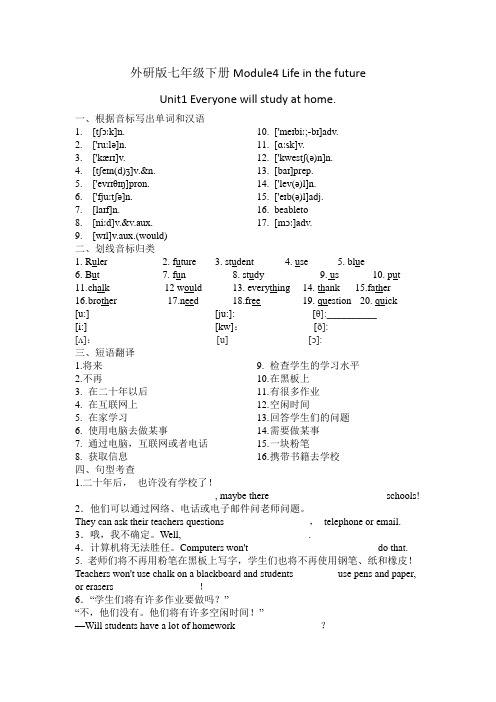
外研版七年级下册Module4 Life in the futureUnit1 Everyone will study at home.一、根据音标写出单词和汉语1.[tʃɔːk]n.2.['ruːlə]n.3.['kærɪ]v.4.[tʃeɪn(d)ʒ]v.&n.5.['evrɪθɪŋ]pron.6.['fjuːtʃə]n.7.[laɪf]n.8.[niːd]v.&v.aux.9.[wɪl]v.aux.(would) 10.['meɪbiː;-bɪ]adv.11.[ɑːsk]v.12.['kwestʃ(ə)n]n.13.[baɪ]prep.14.['lev(ə)l]n.15.['eɪb(ə)l]adj.16.beableto17.[mɔː]adv.二、划线音标归类1.Ruler2. future3. student4. use5. blue6.But7. fun8. study9. us 10. put 11.c halk 12 would 13. everything 14. thank 15.father1.将来2.不再3.在二十年以后4.在互联网上5.在家学习6.使用电脑去做某事7.通过电脑,互联网或者电话8.获取信息9.检查学生的学习水平10.在黑板上11.有很多作业12.空闲时间13.回答学生们的问题14.需要做某事15.一块粉笔16.携带书籍去学校四、句型考查1.二十年后,也许没有学校了!______ ______ ______ _______, maybe there ________ ________ ______schools! 2.他们可以通过网络、电话或电子邮件问老师问题。
They can ask their teachers questions ________ ________,telephone or email. 3.哦,我不确定。
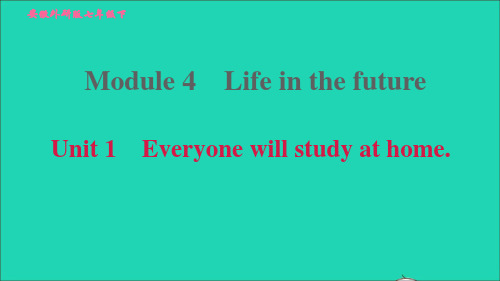
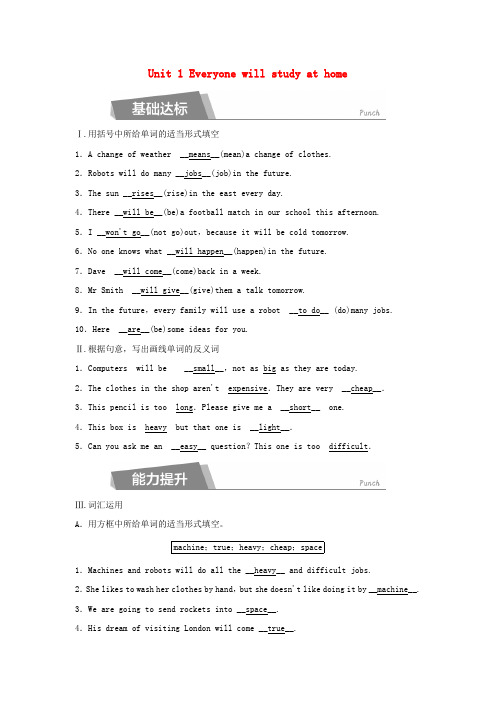
Unit 1 Everyone will study at homeⅠ.用括号中所给单词的适当形式填空1.A change of weather __means__(mean)a change of clothes.2.Robots will do many __jobs__(job)in the future.3.The sun __rises__(rise)in the east every day.4.There __will be__(be)a football match in our school this afternoon.5.I __won't go__(not go)out,because it will be cold tomorrow.6.No one knows what __will happen__(happen)in the future.7.Dave __will come__(come)back in a week.8.Mr Smith __will give__(give)them a talk tomorrow.9.In the future,every family will use a robot __to do__ (do)many jobs. 10.Here __are__(be)some ideas for you.Ⅱ.根据句意,写出画线单词的反义词1.Computers will be __small__,not as big as they are today.2.The clothes in the shop aren't expensive.They are very __cheap__.3.This pencil is too long.Please give me a __short__ one.4.This box is heavy but that one is __light__.5.Can you ask me an __easy__ question?This one is too difficult.Ⅲ.词汇运用A.用方框中所给单词的适当形式填空。
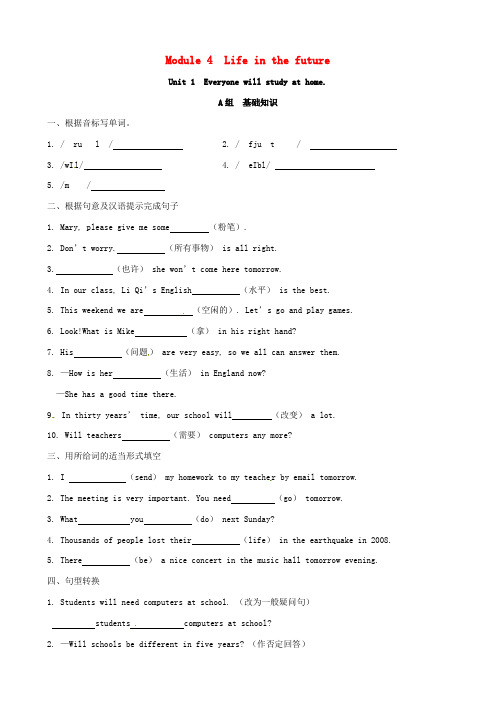
Module 4 Life in the future Unit 1 Everyone will study at home. A组 基础知识 一、根据音标写单词。 1. /ru l/ 2. /fjut / 3. /wIl/ 4. /eIbl/ 5. /m/ 二、根据句意及汉语提示完成句子 1. Mary, please give me some (粉笔). 2. Don’t worry. (所有事物) is all right. 3. (也许) she won’t come here tomorrow. 4. In our class, Li Qi’s English (水平) is the best. 5. This weekend we are (空闲的). Let’s go and play games. 6. Look!What is Mike (拿) in his right hand? 7. His (问题) are very easy, so we all can answer them. 8. —How is her (生活) in England now? —She has a good time there. 9. In thirty years’ time, our school will (改变) a lot. 10. Will teachers (需要) computers any more? 三、用所给词的适当形式填空 1. I (send) my homework to my teacher by email tomorrow. 2. The meeting is very important. You need (go) tomorrow. 3. What you (do) next Sunday? 4. Thousands of people lost their (life) in the earthquake in 2008. 5. There (be) a nice concert in the music hall tomorrow evening. 四、句型转换 1. Students will need computers at school. (改为一般疑问句) students computers at school? 2. —Will schools be different in five years? (作否定回答) — , . 3. There will be a sports meeting next week. (改为否定句) There a sports meeting next week. 4. She is no more a little girl. (改为同义句) She a little girl . 5. Everyone will use paper, pens and erasers. (改为否定句) will use paper, pens erasers.
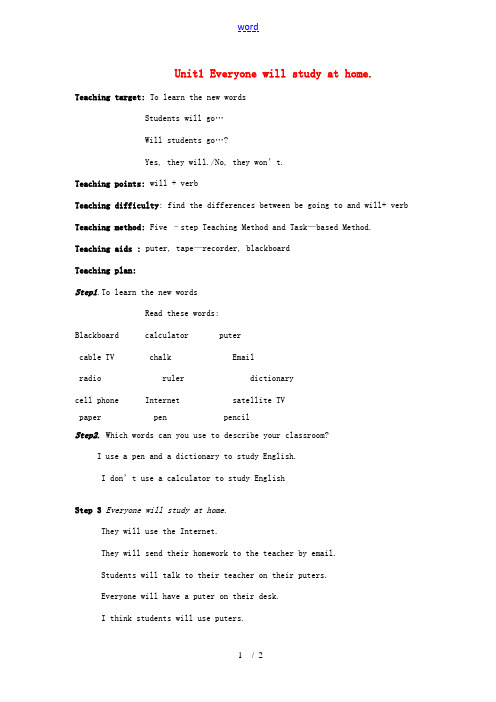
Unit1 Everyone will study at home. Teaching target: To learn the new wordsStudents will go…Will students go…?Yes, they will./No, they won’t.Teaching points: will + verbTeaching difficulty: find the differences between be going to and will+ verb Teaching method: Five –step Teaching Method and Task—based Method. Teaching aids : puter, tape—recorder, blackboardTeaching plan:Step1.To learn the new wordsRead these words:Blackboard calculator putercable TV chalk Emailradio ruler dictionarycell phone Internet satellite TVpaper pen pencilStep2. Which words can you use to describe your classroom?I use a pen and a dictionary to study English.I don’t use a calculator to study EnglishStep 3 Everyone will study at home.They will use the Internet.They will send their homework to the teacher by email.Students will talk to their teacher on their puters.Everyone will have a puter on their desk.I think students will use puters.They will read books.The teachers won’t write on a blackboard. Step 4PracticeWork in pairs and answer the questions. ----What are you looking forward to?---What are you going to do?---Why are you going to do it?.Choose the best answers to the questions. Step 5. They will use the Internet.They won’t use….Will they use…?Yes, they will./ No, they won’t. Step6. Homework.。
Unit 1 Everyone will study at home.
Ⅰ.从括号中选词填空。
1.There is going to be (have/be) a movie on Saturday evening.
2.Will computers be able to(can/be able to) help us like our teachers?
3.—Mr Wang,can I ask you a question (question/problem)?
—Yes,of course.
4.—How soon will you be back?
— In (After/In)about two weeks.
5.I’d like to be a teacher in the future(in future/in the future).
Ⅱ.根据首字母或汉语提示完成句中单词。
1.—Are we going for a picnic?
—I’m not sure.Our plan will change.
2.The life in the future will be different.
3.—I can’t find my watch.
—Maybe it is in your bag or at home.
4.My question is “Where are we going?”
5.—Are you able to win the match?
—Of course,we can.
6.We enjoy our life(生活) today.
7.You speak English well.You’ve got a certain level(水平) of English.
8.I have something to do in my free (空余) time.
9.Will you use chalk(粉笔) and ruler(直尺) in class?
10.Even a child may need(需要) to carry(携带) a lot of books every day.
Ⅰ.单项选择。
1.There will C a new library in our school.
A.are B.have C.be D.has
2.—Will there be schools in the future?
—No,there C .
A.isn’t B.won’t be
C.won’t D.will be
3.Jim and Jack A to Los Angeles in two days.
A.will go B.goes C.go D.is going
4.导学号62434033—Will you send your homework C the teacher
email?
—Yes,I will.
A.for;by B.at;with C.to;by D.by;to
5.— B you study at home in 100 years?
—Yes,I .
A.Are;am B.Will;will C.Will;do D.Are;do
Ⅱ.根据汉语和括号中的英文提示完成英语句子。
1.几年之后我们的生活将会不一样。(will)
In a few years’ time,our life will be different.
2.你能从因特网上获得信息吗?(on the Internet)
Can you get information on the Internet?
3.将来学生们将会怎样学习?(in the future)
How will students learn in the future?
4.学生们可以通过因特网、电话和电子邮件问老师问题。(by)
Students can ask teachers questions by Internet,telephone or email.
5.——我们将不再会有许多要做的作业。
——那太好了。(not...any more)
—We won’t have lots of homework to do any more.
—That will be great.